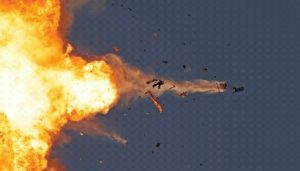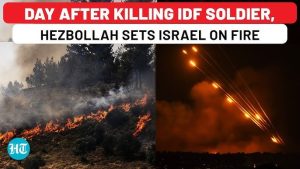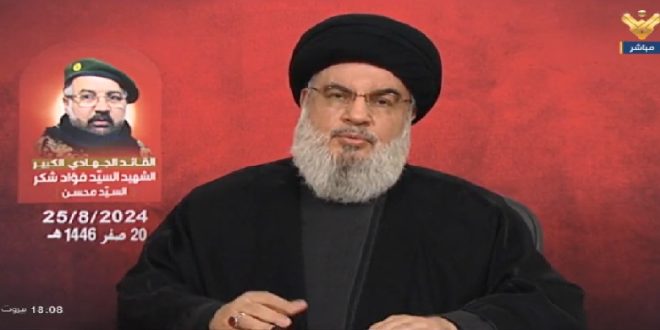26-08-2024
BEIRUT: Hezbollah leader Hassan Nasrallah has made a televised speech after a heavy exchange of fire between the Lebanese group and Israel.
Hezbollah’s attack on Sunday was billed as its response to the Israeli assassination of its senior military commander Fuad Shukr in Beirut last month.
 Israel said it had launched a preemptive strike on Hezbollah sites in Lebanon before the attack began and denied any significant damage in Israel.
Israel said it had launched a preemptive strike on Hezbollah sites in Lebanon before the attack began and denied any significant damage in Israel.
Here are five key takeaways from Nasrallah’s speech:
Hezbollah wants to avoid military escalation
Since October 8, the day when Hezbollah and Israel began exchanging attacks a day after the war on Gaza began, there have been fears that the fighting would escalate into a regional war, drawing in Iran and the United States.
This fear particularly ramped up last month after the killings of Shukr as well as Hamas political leader Ismail Haniyeh in Tehran in an attack believed to have been carried out by Israel.
However, Sunday’s attack on Israel appears to have been a deliberate effort by Hezbollah to avoid a large-scale Israeli response. Nasrallah signaled that the attack had succeeded and he was satisfied with the targeting of Israeli military and intelligence sites.
Nasrallah accused “the Israeli government of hiding its losses and casualties”.
“The clear message from Hezbollah is that the retaliation is now over if, according to Nasrallah, it served its purpose. What he meant by that was if Hezbollah restored deterrence,” she said.
“That means that Israel will no longer act with little restraint in Lebanon. So the hours and days to come will show whether or not this Hezbollah strike will hold Israel back and keep it from crossing red lines.”
Intelligence base was main target
Nasrallah specified that the main focus of Hezbollah’s attack was the Glilot base north of Tel Aviv, which is home to the Mossad, an Israeli intelligence service, and the military intelligence group Unit 8200.
 Nasrallah blamed the intelligence services for the assassinations of Hezbollah commanders.
Nasrallah blamed the intelligence services for the assassinations of Hezbollah commanders.
The Lebanese group’s leader emphasized that the attack struck deep into Israeli territory in contrast to its previous attacks, which largely hit northern Israel and the occupied Golan Heights.
The group carried out the attack “as planned”, he said, rejecting statements by Israeli officials that the attack had failed. He added that Israel was keeping information on the damage caused to Glilot “a secret”.
An Israeli official earlier told media that the attack on Glilot was unsuccessful.
Gaza ceasefire talks delayed attack
Nasrallah acknowledged Sunday’s attack had been delayed for a number of reasons, including to prepare after Israeli and US deployments, the benefits of causing fear among Israelis and a debate among the “axis of resistance”, the name given to an Iranian-led alliance of states and armed groups opposed to the US and Israel on whether members would attack Israel separately or at the same time.
Nasrallah also emphasized that one of the main reasons for the delay was to allow time for Gaza ceasefire talks to succeed.
“Our goal … is to end the aggression on Gaza, so we gave it enough of an opportunity, but after all this time, it is clear that [Israeli Prime Minister Benjamin] Netanyahu is putting in new conditions and the Americans are working with him and this is all a waste of time, so there was no reason to delay any longer,” Nasrallah said. (Int’l News Desk)
 Pressmediaofindia
Pressmediaofindia




